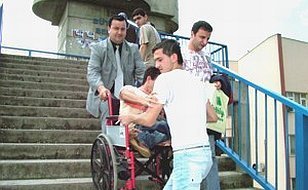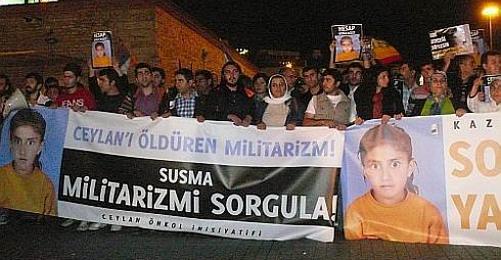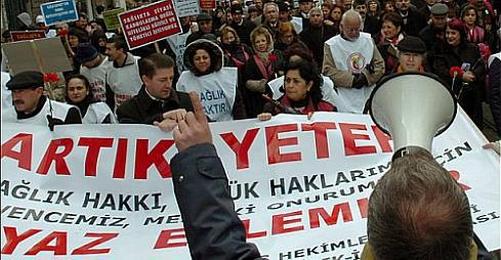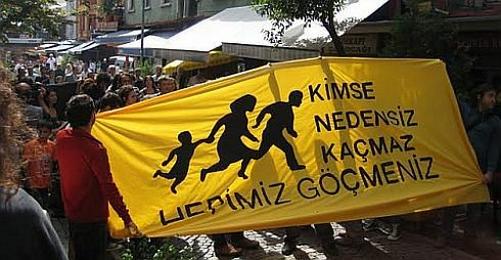The main theme of those involved in this year's disabled week is the deficiency of the country's "Disabled Law" while the struggled continues to prove to the state and non-disabled citizens that those disabled are equal citizens in the community.
Interviewed by Bianet on the issue, Turkey's Disabled Association Chairman Sukru Boyraz said "our primary problem is to exist as much as non-disabled people in regular daily life. There is a law but it is only on paper. Knowing our rights is not sufficient enough because of this".
Human Rights Association (IHD) Secretary General Nejat Tastan who has experience in working on a commission for the disabled several years ago believes that "the more the area of expression of the disabled is restricted, the more their struggle for rights is ignored. Because of this the struggle needs to start from the disabled and their families creating a mentality in this form."
The Turkish Disabled Law which went into force last July is under criticism this year for not reflecting on the daily life of the disabled and for not addressing all issues which, activists say, make rights granted to the disabled dysfunctional.
Boyraz: The law changed nothing
In his interview with Bianet, Boyraz said he believed the Disabled Law made no contribution to the life of disabled people in Turkey. He said that although the Law itself was integrated and comprehensive and despite its naming various rights that could not be achieved until this day, it seriously lacked the power of sanctioning and that this led to the feeling of helplessness.
Boyraz said the disabled were victims in the field of means of access and recalled that the law says for city planning that public areas should be designed for the disabled in no more than seven years. "So what will happen if the design mentioned here is not done within seven years?" he asked. This question is not in the law.
Another issue Boyraz points out is the Turkish Penal Code amendment in article 122 titled "discrimination". He explained that despite adding the word "disabled" to this article, because discrimination itself is not described, the right to make a complaint against discrimination cannot be used and where attempts are made to use it, prosecutors decide on dismissal of proceedings.
"Because the obstacles placed in front of the disabled are directly under the responsibility of local administration" Boyraz said, "those who are creating these conditions are committing an offence against the disabled. But there is no authority to make complaints againts such grievances.
"For example the [Istanbul] Bakirkoy overpass or subway crossing are opportunities on a busy road but the disabled have no way of accessing these. In a petition we gave to the Istanbul Metropolitan Municipality we said we wanted a lift here. But the Municipality informed us that they did not have the funds".
"No money for disabled lifts but money for tulips!"
Boyraz sees Istanbul municipality's investment of 3 trillion to cover the city from end to end in tulips as controversial while the same authority argues lack of budget and funding when it comes to disabled access. He argues that the law for disables is a populist "apology law".
He is also critical of the new Social Security and General Health Insurance Law (SSGSS) for demanding the disabled to pa 20 percent of health services they receive.
Boyraz believes the state is responsible for many disabilities in Turkey and adds, "if there was no traffic terror in this country, if the people were explained the wrongness of marrying relatives, if health services worked totally in all areas, the population of disabled people would not be this high".
The chairman of the Disabled Association wants the state to provide for the immediate needs f the disabled such as wheelchairs and access, without charge.
Stressing that every ministry of the government should be interested in and address the problems of the disabled, Boyraz says architectural access, means of access, education, housing, employment and access to social area opportunities need to be given to the disabled. He adds that under the current circumstances "even if I know my rights, what's going to come out of it?"
Tastan: Struggle of disabled should not be indexed to economic policy
IHD Secretary General Tastan told Bianet that the organisation has been conducting work over the past two years to eliminate discrimination against the disabled in line with United Nations standards on the issue. He said they were working together with disabled organisations in this field and attempting to also identify the place of defending rights in eliminating discrimination.
"The more the disabled are not seen, the more the campaigns are not seen. The problem is actually far more greater than what non-governmental organisations think. Because the disabled do not have the freedom to express themselves in any field" Tastan said.
Pointing out that "policies related to the disabled should not only be based on economics" Tastan argued that NGOs had a great responsibility in making the disabled be seen in daily life.
"The disabled should one by one identify the discrimination they face and do not treat any discrimination as normal" Tastan said. "Because of this, primarily we need a sensitivity on this and an awareness among the disabled themselves and their relatives".
Tastan said that as the disabled were members of the society, they should have a mentality and awareness to demand everything from emplotment to education, access to information, participation in environmental, physical and urban life.
Stressing that Turkey is far behind in disabled rights, Tastan said "at this point the disabled organisations should defend the rights of the disabled and put these targets before them." (EZO/EK/II/YE)















